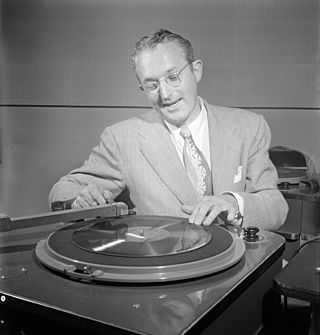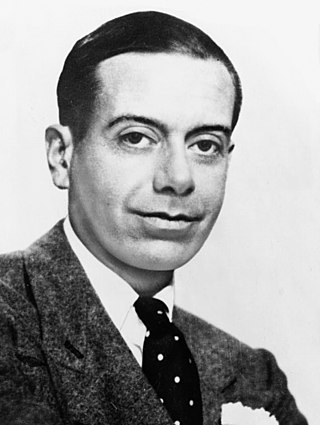Related Research Articles

Thomas Francis Dorsey Jr. was an American jazz trombonist, composer, conductor and bandleader of the big band era. He was known as the "Sentimental Gentleman of Swing" because of his smooth-toned trombone playing. His theme song was "I'm Getting Sentimental Over You". His technical skill on the trombone gave him renown among other musicians. He was the younger brother of bandleader Jimmy Dorsey. After Dorsey broke with his brother in the mid-1930s, he led an extremely successful band from the late 1930s into the 1950s. He is best remembered for standards such as "Opus One", "Song of India", "Marie", "On Treasure Island", and his biggest hit single, "I'll Never Smile Again".

Lucius Venable "Lucky" Millinder was an American swing and rhythm-and-blues bandleader. Although he could not read or write music, did not play an instrument and rarely sang, his showmanship and musical taste made his bands successful. His group was said to have been the greatest big band to play rhythm and blues, and gave work to a number of musicians who later became influential at the dawn of the rock and roll era. He was inducted into the Alabama Jazz Hall of Fame in 1986.

The Ames Brothers were an American singing quartet, consisting of four siblings from Malden, Massachusetts, who were particularly famous in the 1950s for their traditional pop music hits.
"What Is This Thing Called Love?" is a 1929 popular song written by Cole Porter, for the musical Wake Up and Dream. It was first performed by Elsie Carlisle in March 1929. The song has become a popular jazz standard and one of Porter's most often played compositions.

"Begin the Beguine" is a popular song written by Cole Porter. Porter composed the song during a 1935 Pacific cruise aboard the Cunard ocean liner Franconia from Kalabahi, Indonesia, to Fiji. In October 1935, it was introduced by June Knight in the Broadway musical Jubilee, produced at the Imperial Theatre in New York City.
"Lover" is a popular song composed by Richard Rodgers with lyrics by Lorenz Hart. It was sung in the movie Love Me Tonight (1932) by Jeanette MacDonald.
"The Breeze and I" is a popular song.
"Lullaby of Broadway" is a popular song with music written by Harry Warren and lyrics by Al Dubin, published in 1935. The lyrics salute the nightlife of Broadway and its denizens, who "don't sleep tight until the dawn."
"Mam'selle" is a bittersweet song about a rendez-vous with a "mam'selle" (mademoiselle) in a small café. The music was written by Edmund Goulding, the lyrics by Mack Gordon.
Wilfred Williams was an American singer. He had a successful cover recording of Fats Waller's "I'm Gonna Sit Right Down And Write Myself A Letter" in 1957. The record sold over one million copies, and was awarded a gold disc. His trademark hook for his songs was to shout "Oh, Yeah" at the end of lyrics.

"White Christmas" is an Irving Berlin song reminiscing about an old-fashioned Christmas setting. The song was written by Berlin for the 1942 musical film Holiday Inn. The composition won the Academy Award for Best Original Song at the 15th Academy Awards. Bing Crosby's record topped the Billboard chart for 11 weeks in 1942 and returned to the number one position again in December 1943 and 1944. His version would return to the top 40 a dozen times in subsequent years.
"Isle of Capri" is a popular song. The music, a tango foxtrot, was written by Wilhelm Grosz, with lyrics by Jimmy Kennedy and was published in 1934. Ray Noble and his Orchestra with vocalist Al Bowlly, recorded it in London, UK, on August 30, 1934. It was released in November on Victor Records in the United States, reaching number one for seven weeks in early 1935.
"Prisoner of Love" is a 1931 popular song, with music by Russ Columbo and Clarence Gaskill and lyrics by Leo Robin.
"The Gypsy" is a popular song written by Billy Reid and published in 1945. The ballad tells the story of a person who visits a Gypsy fortune teller and is reassured that their partner is faithful. Though they both know it to be untrue, the narrator resolves to return, "'Cause I want to believe the Gypsy".
The Stargazers were a British vocal group, jointly founded in 1949 by Cliff Adams and Ronnie Milne. Other original members were Marie Benson, Fred Datchler and Dick James.
"Pennies from Heaven" is a 1936 American popular song with music by Arthur Johnston and lyrics by Johnny Burke. It was introduced by Bing Crosby with Georgie Stoll and his Orchestra in the 1936 film of the same name.
"Sunday, Monday or Always" is a 1943 popular song with music by Jimmy Van Heusen and lyrics by Johnny Burke.
For music from an individual year in the 1940s, go to 40 | 41 | 42 | 43 | 44 | 45 | 46 | 47 | 48 | 49
Six Hits and a Miss was an American swing-era singing group. The group consisted of six male singers and one female. They performed musical numbers in several Hollywood films of the 1940s, such as Time Out for Rhythm, The Big Store, Hit Parade of 1941, and Girl Crazy.
This is a list of Bing Crosby songs he recorded twice or more during his career, excluding all of the 1954 re-recordings for Bing: A Musical Autobiography.
References
- ↑ Warner, Jay (2006). American Singing Groups: A History from 1940 to Today. Hal Leonard. p. 18. ISBN 0-634-09978-7
- ↑ Luiz Carlos do Nascimento Silva. (2000). Put Your Dreams Away: A Frank Sinatra Discography. Greenwood Press. p. 92. ISBN 0-313-31055-6.
- ↑ Ewen, David (1958). Complete Book of the American Musical Theater. Holt. p. 87. ASIN B0006AWA7K.
- ↑ "Hellzapoppin – Broadway Musical – Original | IBDB".
- ↑ NBC: Kraft Music Hall
- ↑ Larkin, Colin (1995). The Guinness Encyclopedia of Popular Music. Guinness. pp. 766–767. ISBN 1-56159-176-9.
- ↑ Whitburn, Joel (1986). Pop Memories: 1890–1954 . Record Research.
- ↑ Whitburn, Joel (1994). Pop Hits: 1940–1954. Record Research.